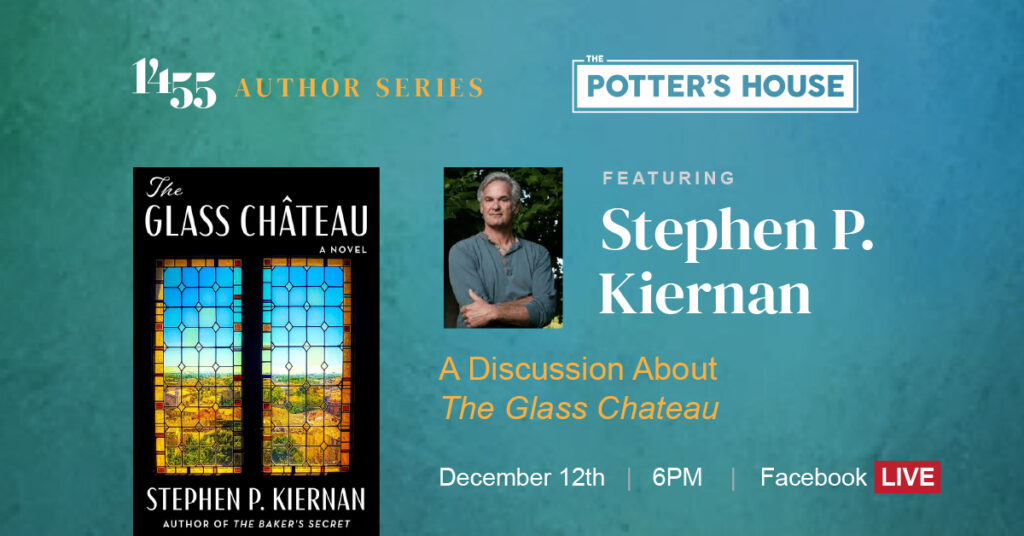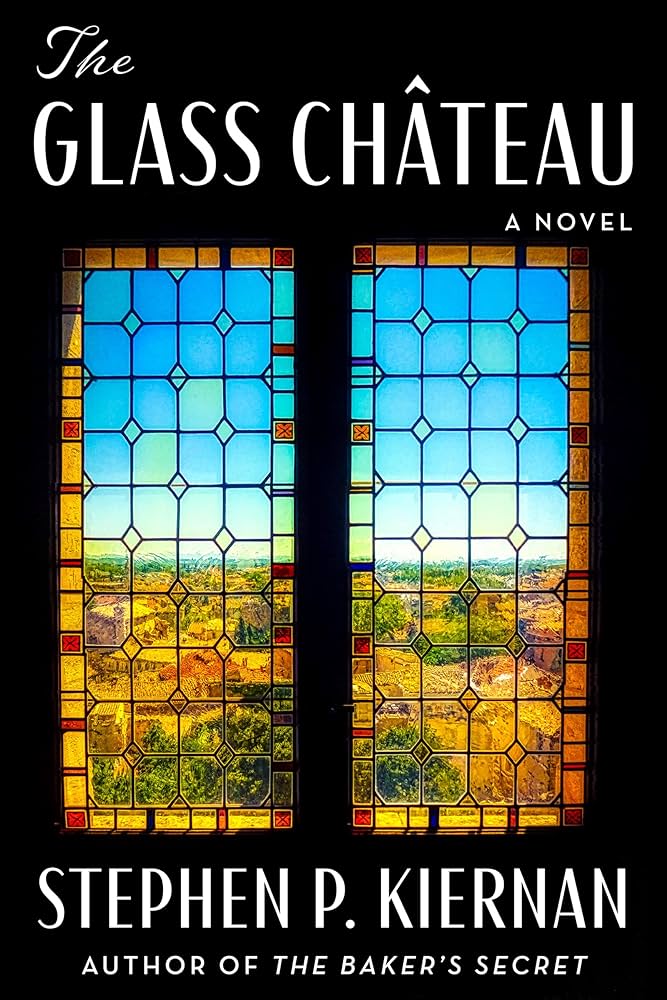
It’s always a special joy to welcome writers back into the 1455 program schedule! This, to be certain, was not my first rodeo with the wonderful author Stephen Kiernan; we locked horns via the 14:55 Author Interview almost exactly three years ago (you can enjoy that here), and we’ve shared virtual space to discuss the remarkable –and highly recommended– anthology ALONE TOGETHER: Love, Grief, and Comfort in the Time of COVID-19 (curated and edited by the awesome Jennifer Haupt; learn more and get your copies here.)
Through these adventures, I became a fan of Stephen the writer and Stephen the person. It was my extreme pleasure to receive an advance copy of his novel, and to say I enjoyed and recommend it doesn’t quite convey the scope of my enthusiasm. We met last night to discuss this book, and inevitably we talked craft, community, and why story is everything (duh) and art has the power to heal (if you know, you know).
A bit about The Glass Chateau. It seems the best thing we might say about any work of art is that it defies time, meaning it will resonate with any audience, at any point in the future. That’s not only true of this novel, it also imparts a bittersweet resonance, as times right now remind us how fractured our world is, how profoundly we need dialogue and understanding. As such, this novel looks at people the world has broken or tried to (in this case, a war and its uncertain aftermath) but in addition to the healing power of community, it also makes a compelling case for the redemptive power of art. (By the way, you can check out an excerpt from the novel here, as it was featured in our recent issue of 1455’s Movable Type!)
One thing I want to point out and celebrate is that this book can at once be described as a reader’s book, meaning it works on many levels for experienced fans of literature, but it’s also a writer’s book, particularly for aspiring writers, because it contains so many readymade lessons. For instance, through the craft of glassblowing we are given just the right amount of detail to understand this painstaking process and what is involved — and this functions on several metaphoric levels, underscoring how any endeavor, like writing, must be learned, practiced, obsessed over…and oftentimes, the creator is still unsatisfied. (This also provides me an opportunity I’m always happy to seize, and invoke George Orwell’s immortal take on novel-writing: Writing a book is a horrible, exhausting struggle, like a long bout of some painful illness. One would never undertake such a thing if one were not driven on by some demon whom one can neither resist or understand.)
Lest that quote from Eric Blair sound heavy or pessimistic, let it suffice to say that Stephen is a necessary and refreshing reminder that authentic art must come from the heart and creating it can even be FUN! Indeed, making a writing life and all this entails can provide a sort of contentment and purpose that may seem unimaginable to the less imaginative amongst us. Read this book, and check out our conversation (below) for both enlightenment and inspiration. Stephen is the real deal, as a writer and human being, and I encourage anyone (aspiring creative or not) to emulate his example.
ABOUT THE BOOK
One month after the end of World War II, amid the jubilation in the streets of France, there are throngs of people stunned by the recovery work ahead. Every bridge, road, and rail line, every church and school and hospital, has been destroyed. Disparate factions—from Communists, to Resistance fighters, to federalists, to those who supported appeasement of the Nazis—must somehow unite and rebuild their devastated country.
Asher lost his family during the war, and in revenge served as an assassin in the Resistance. Burdened by grief and guilt, he wanders through the blasted countryside, stunned by what has become of his life. When he arrives at le Chateau Guerin, all he seeks is a decent meal. Instead he finds a sanctuary, an oasis despite being filled with people every bit as damaged as him. But they are calming themselves, and recovering inch by inch, by turning sand into glass, and glass into windows for the bombed cathedrals of France.
It’s a volatile place, and these former warriors manage their trauma in different ways. But they are helped by women of courage and affection. Asher turns out to have a gift for making windows, and decides to hide the fact that he is Jewish so the devout Catholics who own the chateau will not expel him. As the secrets of the chateau’s residents become known one by one, they experience more heated conflict and greater challenges. And as Asher kindles his talents for glasswork, his recovery will lead the way for them all.
ABOUT THE AUTHOR
As a journalist and novelist, Stephen P. Kiernan has published nearly five million words. His newspaper work garnered dozens of awards — including the George Polk Award for medical reporting, the Scripps Howard National Journalism Award, and the Freedom of Information Award from the Joseph Brechner Center for Freedom of Information at the University of Florida.. Stephen has twice received the Denis Didierot writer-in-residence fellowship to the Chateau d’Orquevaux artists’ colony in eastern France, as well as a New York Newspaper Foundation residency at the Yaddo artists’ colony in Saratoga, NY. Stephen spent many years on the staff of the Breadloaf Writers Conference, and one year on the staff of the Breadloaf School of English. A performer on the guitar since he was ten years old, Stephen has recorded 3 CDs of solo instrumentals, and composed music for dance, the stage and documentary films. He lives in Vermont.
Website: stephenpkiernan.com
Twitter: @StephenPKiernan
LinkedIn: linkedin.com/in/stephen-kiernan-8189bb12
Facebook: facebook.com/StephenPKiernan

